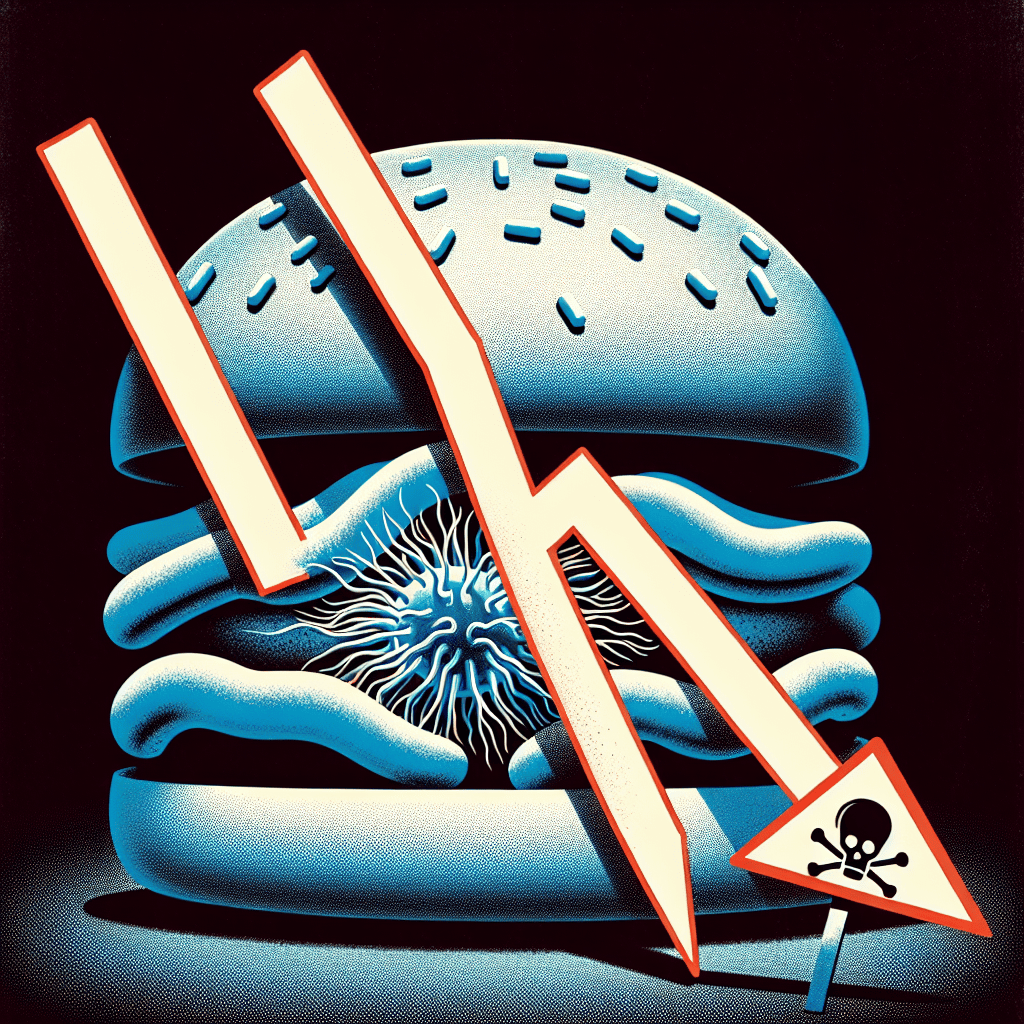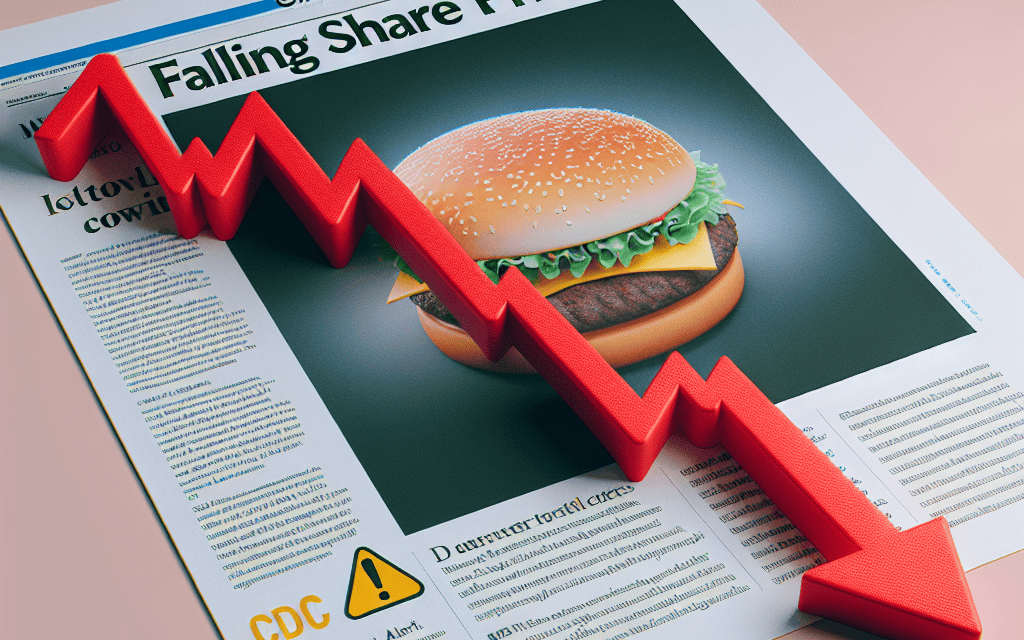“Golden Arches Tarnished: E. Coli Alert Sinks McDonald’s Shares”
Introduction
McDonald’s Corporation faced a significant financial setback as its shares plummeted following an alarming alert from the Centers for Disease Control and Prevention (CDC). The alert was issued in response to an E. coli outbreak that has been linked to the fast-food giant’s popular Quarter Pounder burger. This development has raised serious concerns about food safety and quality control within the company, prompting a swift response from both investors and consumers. As the situation unfolds, McDonald’s is under intense scrutiny to address the health scare and restore public confidence in its brand.
Impact Of E. Coli Outbreak On McDonald’s Brand Reputation
The recent E. coli outbreak linked to McDonald’s Quarter Pounder has sent shockwaves through the fast-food industry, significantly impacting the brand’s reputation. As the Centers for Disease Control and Prevention (CDC) issued an alert, McDonald’s shares experienced a sharp decline, reflecting the immediate financial repercussions of the health scare. This incident underscores the vulnerability of even the most established brands to food safety issues and highlights the critical importance of maintaining rigorous quality control measures.
In the wake of the CDC’s announcement, consumer confidence in McDonald’s has been notably shaken. The fast-food giant, known for its global presence and consistent brand image, now faces the challenge of restoring trust among its customers. The E. coli outbreak has not only raised concerns about the safety of McDonald’s food products but has also prompted a broader discussion about food safety standards in the fast-food industry as a whole. As consumers become increasingly health-conscious, any lapse in food safety can have far-reaching consequences for a brand’s reputation.
Moreover, the timing of the outbreak could not have been worse for McDonald’s. The company has been striving to revamp its image by introducing healthier menu options and emphasizing sustainability practices. However, the E. coli scare has overshadowed these efforts, drawing attention away from the positive changes the company has been trying to implement. This incident serves as a stark reminder that brand reputation is fragile and can be easily tarnished by unforeseen events.
In response to the outbreak, McDonald’s has taken swift action to address the situation. The company has initiated a thorough investigation to identify the source of the contamination and has pledged to enhance its food safety protocols. Additionally, McDonald’s has been transparent in its communication with the public, providing regular updates on the progress of the investigation and the measures being taken to prevent future incidents. While these steps are crucial in managing the crisis, rebuilding consumer trust will require sustained effort and commitment to food safety.
The impact of the E. coli outbreak extends beyond McDonald’s immediate financial losses and brand reputation. It also serves as a cautionary tale for the entire fast-food industry, highlighting the need for stringent food safety measures and proactive risk management strategies. As consumers demand greater transparency and accountability from food providers, companies must prioritize food safety to maintain their competitive edge and protect their brand image.
Furthermore, this incident has sparked a broader conversation about the role of regulatory bodies in ensuring food safety. The CDC’s involvement in issuing the alert underscores the importance of collaboration between public health agencies and the food industry in preventing and managing foodborne illnesses. As the investigation unfolds, it is likely that regulatory standards and industry practices will come under scrutiny, potentially leading to more stringent regulations and oversight.
In conclusion, the E. coli outbreak linked to McDonald’s Quarter Pounder has had a profound impact on the company’s brand reputation, highlighting the critical importance of food safety in the fast-food industry. As McDonald’s works to restore consumer trust, the incident serves as a reminder of the challenges and responsibilities that come with maintaining a global brand. Moving forward, both McDonald’s and the broader industry must prioritize food safety to ensure the well-being of their customers and safeguard their reputations.
Financial Implications Of McDonald’s Share Decline
The recent announcement by the Centers for Disease Control and Prevention (CDC) regarding an E. coli outbreak linked to McDonald’s Quarter Pounder has sent shockwaves through the financial markets, leading to a significant decline in the fast-food giant’s share value. This development has raised concerns among investors and analysts alike, as the implications of such a health scare extend beyond immediate financial losses. The decline in McDonald’s shares underscores the vulnerability of even the most established brands to unforeseen health crises, highlighting the intricate relationship between public health issues and financial stability.
In the wake of the CDC’s alert, McDonald’s shares experienced a sharp drop, reflecting investor anxiety over potential long-term repercussions. The immediate financial impact is evident in the market’s reaction, with shareholders quickly reassessing the company’s valuation. This decline is not merely a reflection of current sales figures but also an anticipation of future challenges, including potential legal liabilities, increased scrutiny from health regulators, and a possible decline in consumer confidence. As a result, the company’s market capitalization has taken a hit, affecting not only individual investors but also institutional stakeholders who hold significant positions in McDonald’s stock.
Moreover, the financial implications extend to the broader fast-food industry, as competitors and suppliers may also feel the ripple effects of this health alert. Investors are likely to exercise increased caution, scrutinizing the supply chain practices and food safety protocols of other major players in the industry. This heightened vigilance could lead to a reevaluation of investment strategies, with a potential shift towards companies that demonstrate robust health and safety measures. Consequently, the E. coli outbreak serves as a stark reminder of the critical importance of maintaining stringent food safety standards, not only to protect public health but also to safeguard financial interests.
In addition to the immediate market reaction, McDonald’s faces the challenge of restoring consumer trust, which is crucial for long-term financial recovery. The company’s response to the crisis will be closely monitored by both consumers and investors, as effective crisis management can mitigate reputational damage and prevent further financial decline. McDonald’s must demonstrate transparency and accountability, taking swift action to address the source of the contamination and implement measures to prevent future incidents. By doing so, the company can reassure stakeholders and gradually rebuild its brand image, which is essential for regaining market confidence.
Furthermore, the financial implications of this share decline may prompt McDonald’s to reassess its operational strategies, particularly in areas related to food sourcing and quality control. The company may need to invest in enhanced safety protocols and employee training programs to ensure compliance with health regulations. While these measures may incur additional costs in the short term, they are necessary investments to protect the brand’s long-term viability and financial performance. In this context, the E. coli outbreak serves as a catalyst for change, compelling McDonald’s to prioritize food safety as a core component of its business strategy.
In conclusion, the plummet in McDonald’s shares following the CDC’s E. coli alert tied to the Quarter Pounder highlights the intricate interplay between public health issues and financial markets. The immediate decline in share value reflects investor concerns over potential long-term repercussions, while also underscoring the importance of maintaining stringent food safety standards. As McDonald’s navigates this crisis, its ability to restore consumer trust and implement effective safety measures will be crucial for its financial recovery and future success.
Crisis Management Strategies For Fast Food Chains
In the fast-paced world of fast food, maintaining a pristine reputation is crucial for continued success. However, even industry giants like McDonald’s are not immune to crises that can shake consumer confidence. Recently, McDonald’s shares experienced a significant drop following an alert from the Centers for Disease Control and Prevention (CDC) regarding a potential E. coli contamination linked to their popular Quarter Pounder burger. This incident underscores the importance of effective crisis management strategies for fast food chains, which must be prepared to address such challenges swiftly and decisively.
First and foremost, transparency is a critical component of any crisis management strategy. In the wake of the CDC’s alert, McDonald’s promptly issued a public statement acknowledging the situation and outlining the steps they were taking to investigate and address the issue. By doing so, they aimed to reassure customers and stakeholders that they were taking the matter seriously. Transparency not only helps to maintain trust but also demonstrates a commitment to consumer safety, which is paramount in the food industry.
Moreover, fast food chains must prioritize communication with both internal and external stakeholders during a crisis. Internally, employees need to be informed about the situation and trained on how to handle customer inquiries and concerns. Externally, clear and consistent messaging should be disseminated through various channels, including social media, press releases, and direct communication with affected customers. This ensures that accurate information is conveyed, reducing the spread of misinformation and speculation that can exacerbate the crisis.
In addition to communication, fast food chains must implement robust quality control measures to prevent such incidents from occurring in the first place. This includes regular inspections of suppliers and adherence to stringent food safety standards. In the case of McDonald’s, the company has already begun reviewing its supply chain processes to identify any potential weaknesses that may have contributed to the contamination. By taking proactive steps to enhance food safety protocols, fast food chains can mitigate the risk of future crises and protect their brand reputation.
Furthermore, collaboration with health authorities and industry experts is essential in managing a food safety crisis. McDonald’s has been working closely with the CDC and other relevant agencies to trace the source of the contamination and implement corrective actions. This collaborative approach not only aids in resolving the immediate issue but also provides valuable insights that can inform future prevention strategies.
Finally, fast food chains must be prepared to make difficult decisions, such as temporarily halting the sale of affected products or issuing recalls if necessary. While these actions may have short-term financial implications, they are crucial for safeguarding public health and restoring consumer confidence. In the long run, demonstrating a willingness to prioritize safety over profits can enhance a company’s reputation and foster customer loyalty.
In conclusion, the recent E. coli alert linked to McDonald’s Quarter Pounder serves as a stark reminder of the challenges fast food chains face in maintaining food safety and consumer trust. By prioritizing transparency, communication, quality control, collaboration, and decisive action, these companies can effectively navigate crises and emerge stronger. As the fast food industry continues to evolve, robust crisis management strategies will remain an indispensable tool for ensuring long-term success and resilience.
Consumer Trust And Food Safety Concerns

In recent weeks, McDonald’s has found itself at the center of a significant public health concern, as the Centers for Disease Control and Prevention (CDC) issued an alert linking an outbreak of E. coli to the fast-food giant’s popular Quarter Pounder burger. This development has not only raised alarm among consumers but has also led to a notable decline in McDonald’s stock value, reflecting the broader implications of food safety issues on consumer trust and corporate stability.
The CDC’s alert came after a series of E. coli cases were reported across multiple states, with a common factor being the consumption of McDonald’s Quarter Pounders. As the investigation unfolded, it became apparent that the source of the contamination was likely linked to the beef used in these burgers. Consequently, McDonald’s has been compelled to take swift action, including temporarily halting the sale of Quarter Pounders in affected regions and collaborating with health officials to trace the origin of the contaminated meat.
This incident has reignited discussions about food safety standards within the fast-food industry, highlighting the delicate balance companies must maintain between efficiency and consumer safety. McDonald’s, known for its rigorous supply chain protocols, now faces the challenge of reassuring its customers while addressing the root cause of the contamination. The company’s response will be critical in determining how quickly it can recover from this setback and restore consumer confidence.
In the wake of the CDC’s alert, McDonald’s shares have experienced a significant drop, underscoring the financial repercussions that can arise from food safety concerns. Investors, wary of the potential long-term impact on the brand’s reputation and sales, have reacted by selling off shares, leading to a decline in the company’s market value. This situation serves as a stark reminder of the interconnectedness between consumer trust and financial performance, particularly in an industry where brand loyalty is paramount.
Moreover, this incident has prompted a broader conversation about the role of regulatory bodies and the effectiveness of current food safety measures. While McDonald’s is taking steps to address the immediate issue, there is a growing call for more stringent oversight and transparency in the food production process. Consumers are increasingly demanding to know where their food comes from and how it is handled, pushing companies to adopt more robust traceability systems and quality control measures.
As McDonald’s navigates this crisis, it must also contend with the potential long-term effects on its brand image. The company has built its reputation on consistency and reliability, and any deviation from these expectations can have lasting consequences. To mitigate the damage, McDonald’s will need to engage in proactive communication with its customers, providing clear and timely updates on the situation and the measures being taken to prevent future occurrences.
In conclusion, the recent E. coli outbreak linked to McDonald’s Quarter Pounder has highlighted the critical importance of food safety in maintaining consumer trust. As the company works to resolve the issue and rebuild its reputation, it serves as a cautionary tale for the entire fast-food industry. The incident underscores the need for continuous vigilance and improvement in food safety practices, reminding all stakeholders of the profound impact that consumer confidence can have on a company’s success.
The Role Of CDC Alerts In Public Health And Business
The recent plummet in McDonald’s shares following the Centers for Disease Control and Prevention’s (CDC) E. coli alert tied to the Quarter Pounder underscores the significant impact that public health alerts can have on businesses. This incident highlights the intricate relationship between public health agencies and the corporate world, illustrating how health alerts can ripple through the economy, affecting consumer confidence and business operations. The CDC, as a pivotal public health institution, plays a crucial role in safeguarding public health by identifying and responding to potential health threats. When the CDC issues an alert, it is typically based on rigorous scientific investigation and data analysis. In the case of the E. coli outbreak linked to McDonald’s Quarter Pounder, the CDC’s alert was a necessary measure to protect consumers from potential harm. Such alerts are designed to inform the public about health risks and provide guidance on how to mitigate these risks, thereby preventing further cases of illness.
However, the implications of these alerts extend beyond public health. For businesses, particularly those in the food industry, a CDC alert can have immediate and profound consequences. The recent decline in McDonald’s shares is a testament to the financial impact that can result from such alerts. Investors, wary of potential losses, may react swiftly to news of health risks associated with a company’s products, leading to a decrease in stock value. This reaction is often compounded by media coverage, which can amplify public concern and further erode consumer trust. Consequently, businesses must navigate the delicate balance between addressing public health concerns and maintaining their market position.
In response to a CDC alert, companies like McDonald’s are compelled to take swift action to address the issue at hand. This often involves recalling affected products, conducting thorough investigations to identify the source of contamination, and implementing measures to prevent future occurrences. These actions, while necessary for public safety, can be costly and time-consuming. Moreover, they require effective communication strategies to reassure consumers and stakeholders that the company is committed to resolving the issue and ensuring the safety of its products.
The role of the CDC in issuing alerts is not only to protect public health but also to prompt businesses to uphold high standards of safety and quality. By identifying potential health risks and alerting the public, the CDC encourages companies to prioritize consumer safety and take proactive measures to prevent outbreaks. This, in turn, fosters a culture of accountability and transparency within the industry, ultimately benefiting both consumers and businesses.
In conclusion, the recent decline in McDonald’s shares following the CDC’s E. coli alert serves as a reminder of the far-reaching impact that public health alerts can have on businesses. While the primary goal of these alerts is to protect public health, they also play a critical role in shaping business practices and consumer perceptions. As such, companies must remain vigilant and responsive to public health concerns, recognizing that their actions not only affect their bottom line but also contribute to the broader goal of ensuring public safety. Through collaboration and communication, public health agencies and businesses can work together to address health risks and maintain consumer trust, ultimately fostering a safer and more resilient food industry.
Lessons Learned From McDonald’s E. Coli Incident
The recent plummet in McDonald’s shares, following the Centers for Disease Control and Prevention’s (CDC) alert regarding an E. coli outbreak linked to the Quarter Pounder, serves as a stark reminder of the vulnerabilities inherent in the fast-food industry. This incident underscores the critical importance of stringent food safety protocols and the potential repercussions of lapses in these measures. As the situation unfolds, it is imperative to examine the lessons that can be gleaned from this unfortunate event, not only for McDonald’s but for the entire food service sector.
First and foremost, the incident highlights the necessity of maintaining rigorous supply chain oversight. In an industry where speed and efficiency are paramount, ensuring that every component of a product meets safety standards is crucial. McDonald’s, like many global food chains, relies on a complex network of suppliers to deliver ingredients. This complexity can sometimes lead to gaps in quality control, as appears to have been the case with the contaminated beef patties. Therefore, companies must invest in robust supply chain management systems that allow for real-time tracking and quality assurance at every stage of production.
Moreover, the outbreak emphasizes the importance of swift and transparent communication with the public. In the age of social media and instant news, any delay or perceived obfuscation can exacerbate the damage to a brand’s reputation. McDonald’s response to the CDC’s alert will be scrutinized not only by consumers but also by industry analysts and competitors. The company’s ability to manage the narrative and demonstrate accountability will be crucial in regaining public trust. This incident serves as a reminder that effective crisis communication strategies are as vital as preventive measures in mitigating the impact of food safety issues.
Additionally, the situation calls attention to the role of employee training in preventing foodborne illnesses. Frontline workers are the first line of defense in ensuring that food safety protocols are adhered to. Regular training sessions and updates on best practices can empower employees to identify potential hazards before they escalate into full-blown crises. McDonald’s, known for its standardized training programs, must now evaluate whether these programs are sufficiently comprehensive and adaptable to address emerging threats.
Furthermore, this incident provides an opportunity for the fast-food industry to reassess its relationship with regulatory bodies. Collaboration with organizations like the CDC and the Food and Drug Administration (FDA) can lead to the development of more effective safety standards and inspection processes. By working closely with these agencies, companies can not only enhance their own safety measures but also contribute to broader public health initiatives.
In conclusion, the E. coli outbreak linked to McDonald’s Quarter Pounder serves as a cautionary tale for the fast-food industry. It underscores the critical importance of supply chain oversight, transparent communication, employee training, and regulatory collaboration. As McDonald’s navigates the fallout from this incident, the lessons learned will undoubtedly shape its future operations and, hopefully, lead to a more resilient and safety-conscious industry. The path forward will require a concerted effort to rebuild trust and ensure that such incidents become a rarity rather than a recurring challenge.
Future Of McDonald’s Menu And Safety Protocols
The recent plunge in McDonald’s shares has sent ripples through the fast-food industry, following an alarming alert from the Centers for Disease Control and Prevention (CDC) regarding a potential E. coli contamination linked to the popular Quarter Pounder. This development has not only raised concerns about food safety but also prompted a reevaluation of McDonald’s menu and safety protocols. As the company grapples with this crisis, it is imperative to explore the potential future of its offerings and the measures it might implement to restore consumer confidence.
In the wake of the CDC’s alert, McDonald’s has been thrust into the spotlight, with both consumers and investors scrutinizing its response. The immediate impact on the company’s stock price underscores the gravity of the situation, as shareholders react to the potential financial repercussions of a food safety scare. Historically, foodborne illness outbreaks have had significant consequences for fast-food chains, often resulting in decreased sales and long-term reputational damage. Therefore, McDonald’s must act swiftly and decisively to mitigate these risks.
One of the primary areas of focus for McDonald’s will likely be its food safety protocols. Ensuring the highest standards of hygiene and quality control is paramount to preventing future incidents. This may involve a comprehensive review of the supply chain, from sourcing ingredients to the preparation and handling of food in restaurants. By implementing more rigorous testing and monitoring procedures, McDonald’s can better safeguard against contamination and reassure customers of its commitment to their well-being.
Moreover, the company may consider revisiting its menu offerings in light of this incident. The Quarter Pounder, a staple of McDonald’s menu, has been implicated in the current E. coli scare, prompting questions about the safety of other menu items. In response, McDonald’s might explore diversifying its menu to include more health-conscious options, thereby appealing to a broader demographic while also addressing safety concerns. This could involve introducing more plant-based alternatives or expanding its range of salads and other fresh offerings.
In addition to these internal measures, McDonald’s will need to engage in transparent communication with the public. Building trust with consumers is crucial, particularly in the aftermath of a food safety alert. By providing clear and timely updates on the steps being taken to address the issue, McDonald’s can demonstrate accountability and foster a sense of confidence among its customer base. This might also involve collaborating with health authorities and independent experts to validate the effectiveness of its safety protocols.
Looking ahead, the future of McDonald’s menu and safety protocols will likely be shaped by a combination of innovation and vigilance. As consumer preferences continue to evolve, the company must remain agile in adapting its offerings to meet changing demands while maintaining the highest standards of safety. This incident serves as a stark reminder of the importance of food safety in the fast-food industry and the potential consequences of lapses in this area.
In conclusion, the recent E. coli alert tied to the Quarter Pounder has presented McDonald’s with significant challenges, both in terms of its financial performance and its reputation. However, by taking proactive steps to enhance its safety protocols and diversify its menu, the company can navigate this crisis and emerge stronger. Ultimately, the future of McDonald’s will depend on its ability to balance innovation with a steadfast commitment to food safety, ensuring that it remains a trusted choice for consumers worldwide.
Q&A
1. **What caused McDonald’s shares to plummet?**
McDonald’s shares plummeted following a CDC alert about an E. coli outbreak linked to their Quarter Pounder burgers.
2. **What product was linked to the E. coli outbreak?**
The E. coli outbreak was linked to McDonald’s Quarter Pounder burgers.
3. **Which organization issued the alert about the E. coli outbreak?**
The Centers for Disease Control and Prevention (CDC) issued the alert.
4. **How did the stock market react to the CDC’s alert?**
The stock market reacted negatively, leading to a significant drop in McDonald’s share prices.
5. **What is the potential impact on McDonald’s sales?**
The E. coli alert could lead to decreased consumer confidence and a potential decline in sales.
6. **Has McDonald’s taken any action in response to the alert?**
McDonald’s may have initiated a recall of the affected products and is likely cooperating with health authorities to address the issue.
7. **What are the health risks associated with E. coli?**
E. coli infection can cause severe stomach cramps, diarrhea, and vomiting, and in some cases, it can lead to more serious health complications.
Conclusion
McDonald’s shares experienced a significant decline following an alert from the Centers for Disease Control and Prevention (CDC) regarding an E. coli outbreak linked to the Quarter Pounder. This development has raised concerns about food safety and consumer trust, impacting investor confidence and leading to a sell-off in the stock market. The situation underscores the importance of stringent quality control measures and effective crisis management strategies in maintaining brand reputation and financial stability in the fast-food industry.





